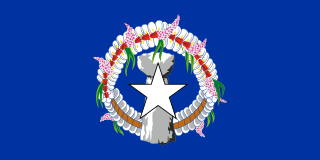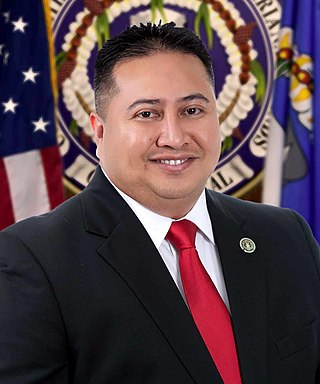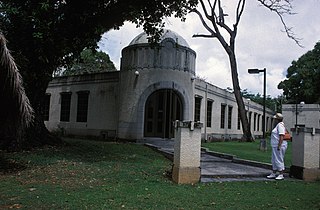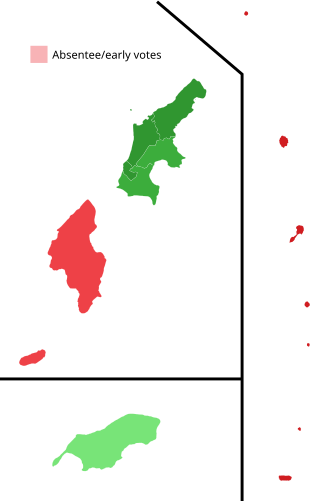Related Research Articles

The Northern Mariana Islands, officially the Commonwealth of the Northern Mariana Islands, is an unincorporated territory and commonwealth of the United States consisting of 14 islands in the northwestern Pacific Ocean. The CNMI includes the 14 northernmost islands in the Mariana Archipelago; the southernmost island, Guam, is a separate U.S. territory. The Northern Mariana Islands were listed by the United Nations as a non-self governing territory until 1990.

Saipan is the largest island of the Northern Mariana Islands, a commonwealth of the United States in the western Pacific Ocean. According to 2020 estimates by the United States Census Bureau, the population of Saipan was 43,385, a decline of 10% from its 2010 count of 48,220.

The District Court for the Northern Mariana Islands is a federal territorial court whose jurisdiction comprises the United States-affiliated Commonwealth of the Northern Mariana Islands (CNMI). It was established by Act of Congress in 1977, pursuant to an international agreement between the United States and the CNMI that brought the CNMI under United States sovereignty. The court began hearing cases in January 1978. The court regularly sits in Saipan but may sit elsewhere in the CNMI. The court has the same jurisdiction as United States district courts, including diversity jurisdiction and bankruptcy jurisdiction. However, the District Court is not an Article III U.S. District Court, and because of that its judge is appointed for a 10-year term instead of for life. Appeals are taken to the Ninth Circuit.
Benjamin Taisacan Manglona was a Northern Marianan politician and civil engineer. He is the CNMI's longest serving elected official having served as a congressman, senator, and former mayor of Rota. Manglona served as the third lieutenant governor of the Northern Mariana Islands from 1990 to 1994 and as Mayor of Rota from 1998 to 2006.
The Jack Abramoff CNMI scandal involved the efforts of Jack Abramoff, other lobbyists, and government officials to change or prevent, or both, Congressional action regarding the Commonwealth of the Northern Mariana Islands (CNMI) and businesses on Saipan, its capital, commercial center, and one of its three principal islands.

The 2009 Northern Mariana Islands general election was held on Saturday, November 7, 2009. This was the last general election to be held on a odd year. This election also saw the extension all office holding officials by one year to move the elections to even-years, corresponding with the elections of other federal and state offices, including the nationwide United States House of Representatives elections and the United States general elections. This election also oversaw the first run-off to be held in the Northern Mariana Islands, which were held on Monday, November 23, 2009.

The Refaluwasch people are a Micronesian ethnic group who originated in Oceania, in the Caroline Islands, with a total population of over 8,500 people in northern Mariana. They are also known as Remathau in the Yap's outer islands. The Carolinian word means "People of the Deep Sea." It is thought that their ancestors may have originally immigrated from Asia, Indonesia, Melanesia and to Micronesia around 2,000 years ago. Their primary language is Carolinian, called Refaluwasch by native speakers, which has a total of about 5,700 speakers. The Refaluwasch have a matriarchal society in which respect is a very important factor in their daily lives, especially toward the matriarchs. Most Refaluwasch are of the Roman Catholic faith.

Pedro "Teno" Pangelinan Tenorio was a Northern Mariana Islander politician who served as the second and fifth governor of the Northern Mariana Islands from January 11, 1982, to January 8, 1990, and then from January 12, 1998, to January 14, 2002.
Froilan Cruz "Lang" Tenorio was a Northern Mariana Islander politician who was the fourth governor of the Northern Mariana Islands. Elected in 1993, he served one term from January 10, 1994 to January 12, 1998. During his governorship and most of his political career, Tenorio was a member of the Democratic Party of the Northern Mariana Islands, which was not then affiliated with the American Democratic Party. However, he later switched his affiliation to the Reform Party, a party he founded. Froilan Tenorio would later switch back to the Democrat in 2005 and then to the Covenant Party in 2009.

Lesbian, gay, bisexual, and transgender (LGBT) rights in the Northern Mariana Islands have evolved substantially in recent years. Same-sex marriage and adoption became legal with the Supreme Court's ruling in the case of Obergefell v. Hodges in June 2015. However, the U.S. territory does not ban discrimination based on sexual orientation and gender identity, except in relation to government employees. Gender changes are legal in the Northern Mariana Islands, provided the applicant has undergone sex reassignment surgery.
Same-sex marriage was legalized in the Northern Mariana Islands by the U.S. Supreme Court's landmark ruling in Obergefell v. Hodges on June 26, 2015, which struck down same-sex marriage bans nationwide. On June 29, Governor Eloy Inos issued a statement hailing the decision as "historic", and said he would work with the Attorney General and local officials to bring the U.S. territory into compliance. Attorney General Edward Manibusan issued a memorandum on June 30 confirming that the territory was bound by the court decision and said that marriage license forms would be changed to include same-sex couples.

The recreational and medicinal use of cannabis in the Northern Mariana Islands has been legal since September 2018. House Bill 20-178 was signed into law by Gov. Ralph Torres, becoming Public Law 20-66. The cannabis legalization bill was introduced as the "Taulamwaar Sensible CNMI Cannabis Act of 2018," named in honor of David Kapileo Peter or Taulamwaar, who advocated cannabis legalization over four years ago. The first dispensary opened to the public on July 16, 2021.

Ralph Deleon Guerrero Torres is a Northern Marianan politician, who served as the ninth governor of the Northern Mariana Islands, from December 29, 2015, to January 9, 2023. He is a Republican from Saipan, Commonwealth of the Northern Mariana Islands (CNMI). The third longest-serving governor in CNMI history, Torres took office upon the death of Governor Eloy Inos on December 29, 2015, before being reelected as governor in his own right in 2018. He previously served as the tenth lieutenant governor, having been elected to that post in 2014.
Teresita Santos is a politician from the Northern Mariana Islands. Formerly a member of the Northern Mariana Islands House of Representatives, she currently serves as a member of the Northern Mariana Islands Senate.
The Office of the Attorney General of Guam aims to serve, protect, and represent the government and the people by enforcing the laws of Guam and the United States. The Office is composed of the following divisions:

The Office of the Attorney General of the Northern Mariana Islands provides "legal counsel and representation to the...government and its agencies in many issues vital to the people’s interest. These issues include the protection of children from abuse and neglect, preservation of the environment, protecting the Commonwealth’s financial assets, the protection of consumers, and public safety." The office has the following divisions:

The NMI Museum of History and Culture, also known as the NMI Museum, is a museum in Garapan, Saipan hosting exhibitions about the Chamorro and Carolinian people and also displays artifacts, documents, textiles, and photographs from the Spanish, German, Japanese, and American periods in the Northern Mariana Islands. The museum has repatriated a significant number of historic objects from the Marianas that were held nationally and internationally in private collections and by foreign museums, companies, and militaries. More than one million dollars has been invested in its collections. The historical buildings on the grounds have been renovated to preserve them, prevent further deterioration, and safeguard visitors. The museum is located across from Sugar King Park.
The COVID-19 pandemic in the North Mariana Islands is part of the ongoing worldwide pandemic of coronavirus disease 2019 caused by severe acute respiratory syndrome coronavirus 2. The COVID-19 pandemic was confirmed to have reached the United States Commonwealth of the Northern Mariana Islands in March 2020.

The 2022 Northern Mariana gubernatorial election took place on November 8, 2022 to elect the governor of the Northern Mariana Islands and the lieutenant governor of the Northern Mariana Islands to a four-year term in office. Because no candidate received 50% of the vote in the general election, the two highest-placing candidates advanced to a runoff election on November 25, 2022.
References
- ↑ "Legal opinion backs abortion". Saipan Tribune. May 12, 2000. Retrieved May 15, 2022.
- ↑ "Lang: Abortion is illegal in CNMI". Saipan Tribune. May 17, 2000. Retrieved May 15, 2022.
- ↑ Boyette, Chris; Croft, Jay (June 7, 2019). "Abortion is legal in Guam. But the closest provider is a long flight away". CNN. Retrieved May 15, 2022. Updated June 8, 2022.
{{cite news}}: CS1 maint: postscript (link) - 1 2 3 "No abortion providers on Guam". Pacific Daily News. Retrieved 2019-05-29.
- ↑ "Crimes and Punishment" (PDF). Cnmilaw.org. Retrieved 2015-07-29.
- 1 2 3 Arndorfer, Elizabeth; Michael, Jodi; Moskowitz, Laura; Grant, Juli A.; Siebel, Liza (December 1998). A State-By-State Review of Abortion and Reproductive Rights. DIANE Publishing. ISBN 9780788174810.
- 1 2 "Legal opinion backs abortion". Saipan News, Headlines, Events, Ads | Saipan Tribune. 2000-05-12. Retrieved 2019-05-29.
- ↑ "Digest of Cases Reported" (PDF). Cnmilaw.org. Retrieved 2015-07-29.
- ↑ "Lang: Abortion is illegal in CNMI - Saipan News, Headlines, Events, Ads". Saipan Tribune. 17 May 2000. Retrieved 2015-07-29.
- ↑ "Legal opinion backs abortion - Saipan News, Headlines, Events, Ads". Saipan Tribune. 12 May 2000. Retrieved 2015-07-29.